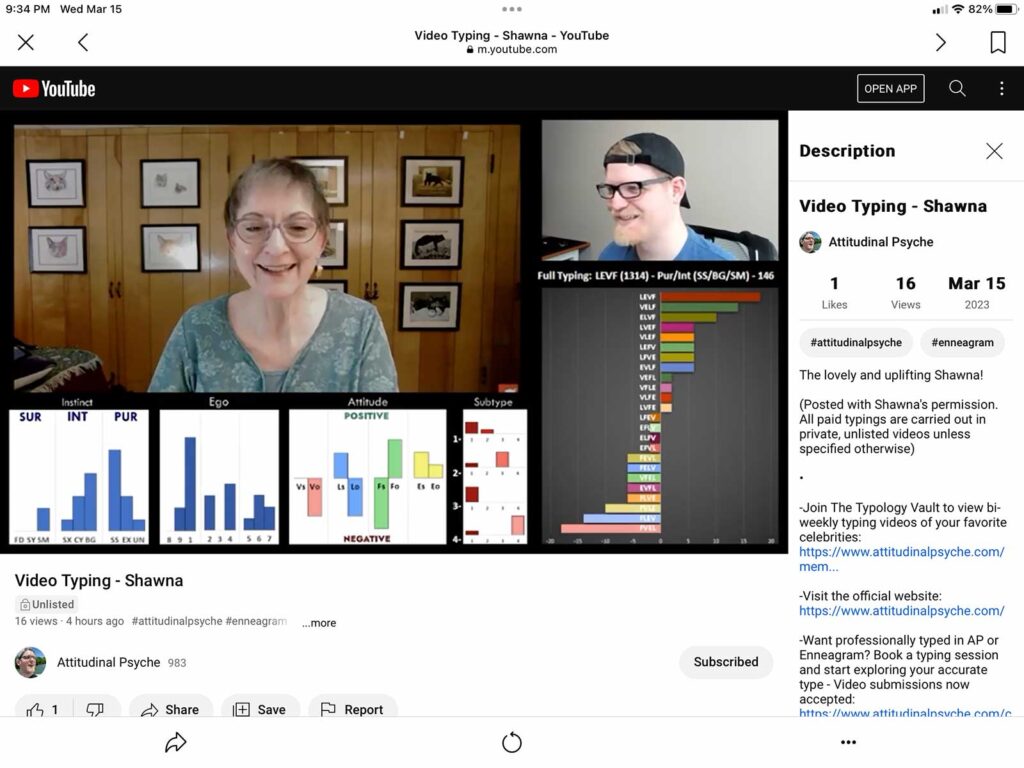Typing Interview by AP’s Rob Zeke Collopy
An Offer I Couldn’t Refuse
As a member of the Attitudinal Psyche group on FaceBook, I immediately spotted a post by the group’s founder and administrator, Rob Zeke Collopy. In it he offered to give a free typing analysis for anyone who responded by the deadline, providing a video in which he/she answered a set of questions he provided. Naturally I had to participate. I got a copy of the questions and wrote out my answers. Then I created a video of myself answering the questions, uploaded it to YouTube, and provided Rob with the link.
A number of people responded to this offer; there were so many that Rob had to move up the deadline. Eagerly I waited for my turn to come, and finally it did.
An Analysis Both Expected and Surprising
My Reactions to the Typing
I first want to express my deep appreciation for the opportunity to have Rob analyze my video to identify my AP and Enneagram types. I was very impressed with his insight and the relaxed, friendly demeanor he exhibits as he provides commentary. The overlay which shows the emergence of different elements of the typing is helpful, too.
I should mention as well that Rob has typed me before, with both an online live interview and his AP-QAI test based on my written answers to several questions. I have also taken several versions of his online tests available on the AP website. As a result, some of his findings in this recent typing video were not surprising: my 1L-1 and 3V-1 have been consistent across the various tests. What was new to me was the idea that accentuated types can access all of the various subtypes for that element to some degree. That makes a lot of sense to me. It also helps me understand how Rob typed me as 4F-4. The AP-QAI had me as 4F-1 and recent online tests typed me as both 4F-1 and 4F-2. Even in my video I can see the truth of the statement that 4F-4 types “can fall into patterns of carelessness about the physical world” (disgust with dusting) and are “strongly secure in what they have and how they currently feel physically.”
What was a surprise was that I turned out to be a 2E-3. In the AP-QAI and online tests, I was pretty consistently a 2E-2 (and possibly once a 2E-1), so this was a change. I can see the “strongly opinionated,…usually artistic” character of the 2E-1 in myself, as well as the person who “discusses learned lessons of life and how their relationships have affected them”; other elements of this subtype I don’t see as much of in myself. As for the 2E-2, I can see myself as able to “withstand nonstop emotional pressure and anger,” but not as “most talkative…and emotionally open.” I am usually able to “notice emotional manipulation with ease,” but not always. Sometimes it takes a bit of time. I am still considering how well the 2E-3 fits me and will contemplate that for a while. In view of previous testing, I am tempted to conclude that I am a 2E-2, who is able to access more than one E subtype.
The Enneagram analysis was also very insightful and accurate. The one surprise was how little of the 5 showed up in my video. I have taken two recent Enneagram tests online. The most recent one was through a Facebook group over a period of about a month; in that one I turned out to be 1w9 5w4 4w5 sx/sp. The other was Katherine Fauvre’s test, followed by an online interview with her to analyze the results. Although that test came out 145 sx, Katherine identified my type as 146 sx, based on a 7 card in my Enneaspread. It is interesting that Rob found some 7 in my answers. The 1 lead type was no surprise, nor was the 2 wing attached; these are typical for me in previous tests. I would assume, based on Rob’s analysis, that my 4 has a 5 wing, since there was no 3 at all. I will have to contemplate, however, whether the 7 he found is my 6 wing or an indication of a healthy 1 moving to 7.
The instincts results are unique to this typing, since Rob does not use the standard sp/sp/sx categories. The new categories originated with a friend of Rob, and Rob fleshed them out with subtypes. These categories are:
- Self-Survival (SS)
- Security (SY)
- Fortitude (FD)
- Self-Management (SM)
- Interpersonal (INT)
- Community (CY)
- Sex (SX)
- Bonding (BG)
- Purpose (PUR)
- Existentialism (EX)
- Self-Significance (SS)
- The Unknown (UN)
I approve of the new set of categories and feel that Rob was accurate in determining mine as Self Significance, then Bonding, and finally Self-Management. I also note that my scores for Existentialism and Community were higher than my Self-Management score. I was surprised that none of the interview questions really drew out my deep longing for intimacy of ALL types with a partner (soulmate?). I don’t know whether that would have influenced the results, had such a question been included.
